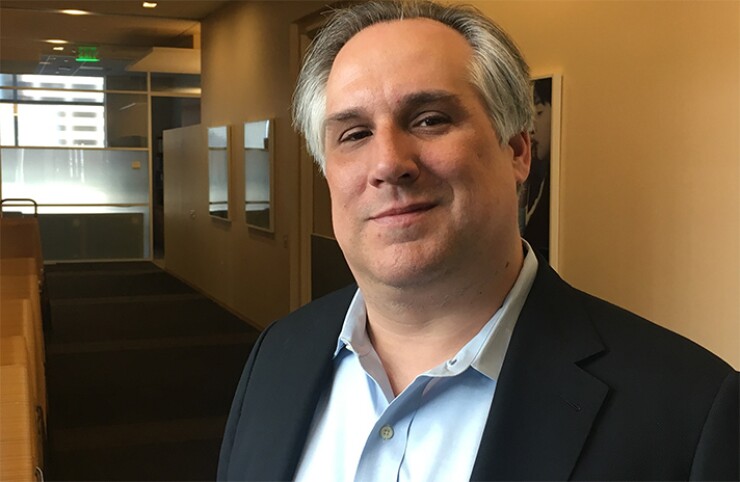Tax attorney Rich Moore becomes president of the National Association of Bond Lawyers on Wednesday, promising to continue the organization’s engagement with Washington lawmakers and expand educational offerings for members.
Moore, a tax partner at the San Francisco headquarters of Orrick Herrington & Sutcliffe, has worked there specializing in public finance since his 2001 graduation from UC Hastings College of the Law in San Francisco.

“I call myself a Section 103 attorney and I’ve been doing that from the get-go,” said Moore, making reference to the part of the federal tax code that enumerates the requirements for the interest on bonds to be tax-exempt.
Moore, who was born and raised in Oakland, California, has lived in the Bay Area except for college when he attended UC San Diego.
He continues to live there with his wife Lindsey and two young children who are six and four.
Moore takes over the top spot at NABL during the first day of a three-day annual conference in Chicago that the association has renamed as The Workshop as part of a rebranding of its educational offerings.
Conferences and all educational programs have been put under the umbrella as NABL U. The educational offerings have been expanded over the last year with more on-demand e-learning that includes recorded podcasts, webinars and webcasts.
“We want to add a lot more,” Moore said in an interview with The Bond Buyer on his objectives for NABL in the coming year.
Moore is taking over as president from Dee Wisor, an attorney at Butler Snow in Denver, who established a new NABL governmental affairs committee during his one-year tenure.
The establishment of that committee was a response to the setback suffered by the public finance sector by congressional enactment of the Tax Cuts and Jobs Act in December 2017 with a provision terminating advance refunding. Prior to the law’s final enactment, a House version of the bill also proposed terminating the tax-exemption for private activity bonds.
Fortunately for the public finance sector, the PABs termination was removed in final Senate-House negotiations.
But the wake-up call was heard loud and clear.
“In the past six months alone, NABL has had more than 25 meetings on Capitol Hill,” Moore said, describing the efforts to educate congressional staff and lawmakers about the benefits state and local governments of this financing tool.
NABL has identified attorneys in its membership who live or work in congressional districts where members of the House of Representatives sit on committees with jurisdiction over public finance issues.
NABL is focusing its lobbying effort on trying to influence whatever infrastructure legislation might be enacted by Congress in the next year.
“As we get further away from 2017, there’s less and less of a desire from folks on the Hill to engage in a discussion of revisiting the Tax Cuts and Jobs Act, so we’re focusing on bonds in the context of infrastructure,” Moore said.
The NABL priorities include persuading lawmakers to maintain the tax exemption for municipal bonds, preserve private activity bonds and reinstate advance refundings as a way to enhance infrastructure financing.
Also on the checklist are reinstatement of direct-pay bonds similar to Build America Bonds with an exemption from sequestration cuts and expanding the cap on bank qualified bonds to $30 million from $10 million with an inflation index and the limit pegged to the borrower.
“There might be limited opportunities for legislation to be passed between now and the presidential election,” Moore said. “But they will be limited. We don’t expect big comprehensive bills to be enacted in this environment.”
NABL is focusing its tax efforts on legislation because there’s not much opportunity to see movement from the Trump administration on the regulatory side of tax issues.
Even so, NABL is working on the regulatory side with a comment paper to reduce the Internal Revenue Service user fee for private letter rulings from the current $30,000 to something more affordable to state and local governments.
NABL also is monitoring the update in the IRS rule for re-issuance and the movement away from Libor to a new index whether it’s SOFR or SIFMA.
Moore thinks “it’s too early to know” which index will become the preferred replacement in the municipal finance sector.
In the area of securities regulation, NABL has several initiatives underway.
“We are continuing to work on practical considerations for the members relating to the amendments to rule 15c2-12 that became effective this past February,” Moore said.
A NABL document released in July by a working group of the securities law committee summarized questions from members and identified public statements by the SEC’s Office of Municipal Securities staff that provided information on how people are working with the amendments for use in their practice.
In addition, NABL is crafting a disclosure paper to address the Rule 15c2-12 amendments and to include social media procedures.
“We are working on guidance or considerations on interpreting continuing disclosure undertakings when there are changes in the issuer or obligated person’s business,” Moore said.
Elsewhere in the securities law area, NABL is working on a white paper on underwriter due diligence in competitive and negotiated sales.
And in what Moore described as a “bigger picture” project, NABL is asking the SEC to release an update to the 1994 interpretive release on Rule 15c2-12.
“We really haven’t made a push for it, I’d say, since earlier in this decade,” said Moore. “I think the idea is that enough has been happening in the market that it’s time to renew that push.”
NABL’s General Law Committee, which handles issues not related to tax or securities law, has a number of scholarly papers in the works that will be submitted for law journal publication.
They include papers on financing of charter schools, the constitutional basis for tax-exempt bonds, the nature of the lien and an updated model bond opinion.
“The hope is that is going to be a couple per year indefinitely,” Moore said.





